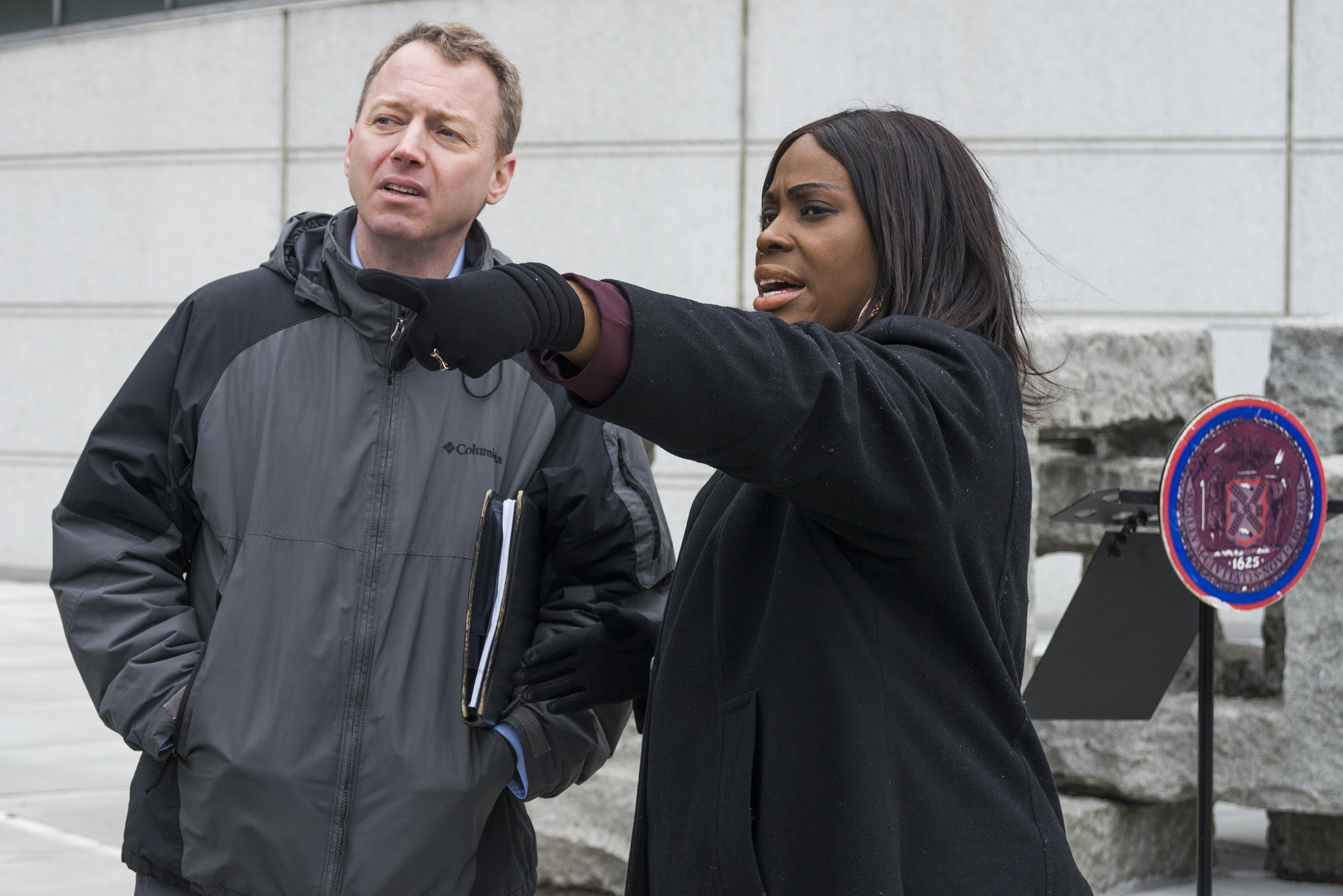Vanessa Gibson, the first woman and first Black to hold the office of Bronx borough president, has been breaking through glass and race barriers for most of her life.
Her third month in office is also Women’s History Month, so the Mott Haven Herald and Hunts Point Express reached out to her to discuss how she arrived at her position of power and what she hopes to accomplish as the first Black and first woman to lead the Bronx.
A little background first. She’s a Brooklyn native who attended the University of Albany, majoring in sociology. During her senior year, she applied for a legislative internship and was assigned to Aurelia Greene, who represented the 77th Assembly District in western Bronx. After graduating in 2001, Gibson was hired full time as a legislative aide to Greene, who became a mentor.
In 2009, when Greene stepped down, she encouraged Gibson to run for her Assembly seat. Even though Gibson was in the midst of completing a master’s degree in public administration at Baruch College, she ran and won handily. Then in 2013, it was on to the New York City Council, again representing the western Bronx.
From there, it was a short hop to becoming borough president. When Ruben Diaz Jr. stepped down last year, Gibson had no serious contenders for the job – winning by 80% of the vote.
It’s an impressive trajectory. Although many women have made strides in political representation, there’s still significantly a higher percentage of males in political office. According to the National Organization for Women, women make up less than 24% of the New York City Council and 32% of the Assembly in 2020.
Here’s the account of our interview with Gibson. Questions and responses have been condensed for clarity and space.
Q: How did you balance the special election and your master’s program at Baruch?
Gibson: Once I got close to the election, and I was actually campaigning, I was able to get a lot of leniency from my professors. I’ve always been a hard worker, I’ve always worked endless hours. One of my classmates, I’m forever grateful. He was my tutor in one of my classes because I struggled in economics, and he was able to really help me out. So it turned out to be really good.
Q: Why did you pursue politics in the Bronx as opposed to other boroughs?
Gibson: I felt like it was the right thing to do and where God had placed me. Although, I’m not a native of the Bronx, I have certainly been here for 20 years now. Being in the trenches, having multiple elected positions, cultivating relationships with stakeholders, and colleagues, and government, are all of the things that we know really matter in your leaders. You want leaders to reflect the diversity, you want them to have a commitment, have dedication and have a real plan to get work done.
Q: What was the transition like between former Borough President Ruben Diaz Jr. and your current administration?
Gibson: I didn’t realize in my first week of office I would have the most horrific fire that claimed the lives of 17 neighbors. I had to deal with it on the ground, responding and making sure that agencies were doing their jobs, and really leading the borough during a time of challenge, but we did it. Since then, we’ve had other fires and other explosions, and catastrophes in the Bronx. It’s just been one after another, but I feel like we’ve not only stood up to the challenges, but we have not let it get the best of us.
Q: What do you want your legacy as the 14th Bronx borough president to look like?
Gibson: I want my legacy to be one of meaning and significance, of cultivating a new wave of leadership, of elevating and amplifying the voices of young people so they understand the role they play and that they are destined for success. There’s a role for them in our community, joining the local community boards, being a part of our youth council, and really giving young people the space that they rightfully deserve.
They are a part of our events, young African American and Latino men and women, college-bound high school graduates that are making history. That is a reflection of the Bronx, not the negativity, not the shootings, and stabbings and robberies, and poverty and everything that the media always talks about.
We have to change that narrative, and talk about good things. And people that are working hard every day, That is what I want my legacy to be – one of commitment, of consistency, of dedication, of working to create new opportunities, strengthening our small businesses, giving young people a voice and getting families out of poverty and developing ownership opportunities and creating pathways to economic prosperity as a middle class.
Q: As a Black woman, how do you believe your identity has helped shape the way you lead and represent the Bronx?
Gibson: I want little Black girls and Latina girls to see themselves in me. To see all the possibilities, all the dreams and all their hopes and aspirations for a better tomorrow. I don’t want our young people to feel blocked by their neighborhood, by the zip code they represent or any other category that’s used to associate that.
Q: Has being a Black woman in politics been a difficult journey for you
Gibson: When opportunities present themselves for Black and Latino women to step up, sometimes we’re not given our fair share. But it has not been a barrier to my success. It has been an encouragement, it has allowed me to fight the good fight to step up to push even harder, to not accept the status quo, not accept what people are telling me when they say it’s not your time, The hell it is! Let me show you what I can do. Watch me work. And we have succeeded.

